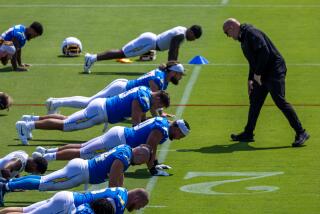San Diego officials say $1.1-billion stadium plan for Chargers is âon trackâ
As the barons of the NFL met near Chicago to discuss relocation issues, San Diego officials announced Monday that planning is âon trackâ to build a $1.1-billion stadium to keep the Chargers from leaving San Diego.
At a midday news conference in San Diego, Mayor Kevin Faulconer, county Supervisor Ron Roberts, and City Atty. Jan Goldsmith sought to assure the public â and the NFL â that a financing plan, an environmental impact report and a political campaign are ready to win public approval, if only the Chargers would return to the bargaining table.
âWe remain extremely well positioned to negotiate with the Chargers a stadium deal that will meet the NFLâs timelines,â Roberts said.
Goldsmith said, âIf the NFL wants a franchise in the nationâs eighth-largest city, we have demonstrated we can move quickly toward a public vote.â
Chargers counsel Mark Fabiani has said the team will not cooperate with a hurry-up environmental impact report process that is unlikely to survive a legal challenge. The team also does not like the cityâs chosen location in Mission Valley, preferring instead a downtown site.
Undeterred, Faulconer and other officials released an environmental impact report and said a Jan. 12 vote is a possibility if the Chargers cooperate.
The Chargers have announced plans for a joint-use stadium in Carson with the Oakland Raiders. Both teams appear to be in a rush to beat the St. Louis Rams into the lucrative Los Angeles market. The Rams owner has announced plans for a stadium and entertainment center in Inglewood.
A committee of NFL owners, meeting in a hotel in Schaumburg, Ill., planned to discuss the possible relocation of one or more teams to the Los Angeles market, which has been bereft of an NFL team since the Rams and Raiders departed two decades ago. No vote is expected.
San Diego is represented at the meeting by New York attorney Chris Melvin, a specialist in high-profile negotiations for sports venues. Also in Chicago are Faulconerâs chief of staff, an attorney from the San Diego County counselâs office, and the director of the cityâs land use department. At the NFLâs request, no politicians attended the gathering.
Officials released a series of conceptual drawings of the new 68,000-seat stadium done by the Kansas City, Mo.,-based architectural firm Populous, which has been involved in numerous stadium projects. The drawings were also part of the San Diego presentation to the NFL committee.
The new stadium, which would be built in Mission Valley at the site of the aging Qualcomm Stadium, would accommodate sports, entertainment, civic and commercial events, Faulconer said. He noted that upkeep on Qualcomm over the next 20 years is set to cost $282 million and that the stadium needs $85 million in repairs.
Both figures would doubtless be part of a public campaign in favor of a new stadium â the argument being that it is better to build something new than try to maintain something that is old.
For financing, the project envisions $362.5 million from the Chargers, $200 million from the NFL, and $350 million from the city and county, along with personal seat license revenues and other sources. Faulconer has pledged to submit financing to a public vote even if not required to do so by law.
Of the five most recently built stadiums in the NFL, public financing accounted for an average of 48%, Faulconer said. The San Diego proposal, he said, would cap public financing at 32%, without a tax increase.
âA stadium plan must be good for taxpayers and our community,â Faulconer said, âand I wonât accept anything less.â
RELATED:
Chargers, Raiders spend almost $900,000 on stadium ballot measure
L.A.-area venues showing little interest in being temporary NFL host
More to Read
Go beyond the scoreboard
Get the latest on L.A.'s teams in the daily Sports Report newsletter.
You may occasionally receive promotional content from the Los Angeles Times.










